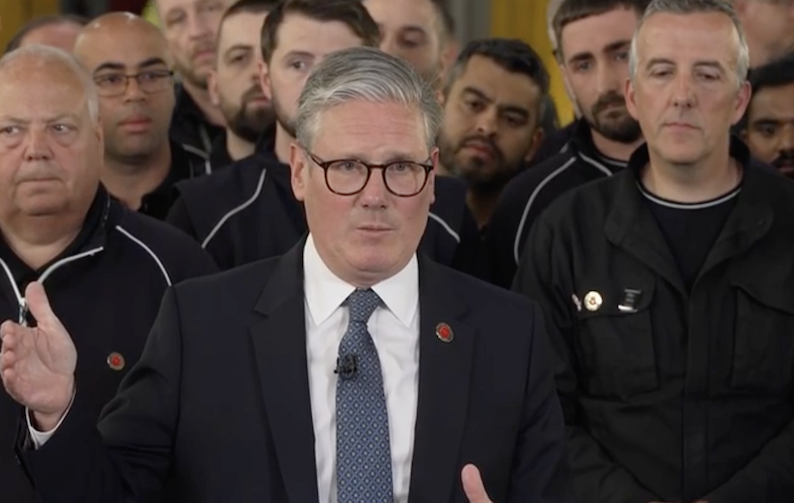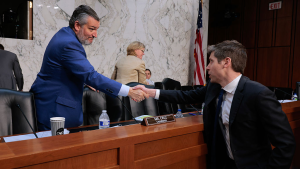Salmon still facing tariff ‘barrier’ in UK-US deal – Daily Business



Scotland’s key salmon sector is among those feeling short-changed by the UK-US tariff agreement despite it being hailed as a breakthrough on both sides of the Atlantic.
Salmon industry leader Tavish Scott led Scottish calls for more negotiations to improve the agreement that President Trump described as a “full and comprehensive deal”.
Analysts saw it as creating more of a framework for a deal that will take months to negotiate.
The tariff on car exporters was cut from 25% to 10% and removed entirely from steel and aluminium. The UK will import more US beef, but hormone-treated beef will not be allowed into Britain.
Most UK companies, including those in the salmon sector, still face the 10% levy imposed by President Trump last month.
The US is the second-largest export market for Scottish salmon, with sales in 2024 of £225 million – accounting for more than a quarter of all salmon exported from the UK, both in value and volume.


Mr Scott spoke today with the UK Minister for Food Security and Rural Affairs, Daniel Zeichner, following earlier meetings with salmon businesses at the world’s biggest seafood sales expo in Barcelona on Tuesday.
“The 10% tariff on exports to the US remains a barrier, and we want to see it removed,” said Mr Scott. “I have pressed Minister Zeichner for further negotiations to help our sector grow in the American market, which is already one of our most valuable. We want to build on that success.
“Today’s US-UK deal should be seen as a staging post – not the destination – on the path to reducing trade barriers, securing jobs in Scotland, and driving economic growth.”
Similarly, Shevaun Haviland, director general of the British Chambers of Commerce, said: “This must not be the end of the process; we must continue to push the argument for free and fair trade across all economic sectors and that tariffs are a lose-lose position. ”
Prime Minister Sir Keir Starmer insisted that he had refused to choose between the US and the EU.
“I believe that we can have a good relationship with the US and EU”, he said. “Look what we’ve shown, through patience, through pragmatism. I’ve always said the strength of the UK is being about dealing with the US and the EU.”
However, he said: “We would like to go further.”
Douglas Alexander, the trade minister, insisted the agreement was good for Britain. “This deal will protect UK jobs while laying groundwork with increased transatlantic trade and investment,” he told the Commons.
However, Liberal Democrat leader Ed Davey, a Trump critic, said: “Trump’s terrible tariffs will still be hitting British jobs and businesses hard”.
Kemi Badenoch, the Conservative party leader, said: “Keir Starmer called this ‘historic’. It’s not historic, we’ve just been shafted.” Reform UK’s Nigel Farage was more conciliatory arguing that the deal was a step in the right direction.
Markets were underwhelmed, with the FTSE 100 down 27.72 points (0.32%) at 8,531.61, even though interest rates were also cut today. Even so, analysts were encouraged by the direction of travel.


Thomas Moore, senior investment director at Aberdeen Group, said: “The full details of the US/UK trade deal will emerge gradually over the coming weeks, with specific UK sectors such as automotive and aerospace the clear early beneficiaries.
“Looking more broadly at the implications of the deal, investors should be reassured that the US is signalling its willingness to hammer out more trade deals.
“Any thawing in US/China relations would be warmly received by markets. As more deals are signed, this sets up a positive outlook for equity markets as the wall of worry is climbed.”
Matthew Ryan, head of market strategy at global financial services firm Ebury said: “Britain has unexpectedly jumped to the front of the queue in discussions with the White House and, as this is the first deal to be struck in the post-Liberation Day era, the details are likely to act as a blueprint for other countries’ negotiations.
“The main focus surrounded whether the 10% baseline tariff would be relaxed, or if the easing in restrictions would merely be limited to certain sectors. The fact that it is the latter is not at all surprising, not least as Trump still needs the revenue to fund his US tax cuts.
“This does at least throw shade over the extent to which these tariffs can be negotiated away, and how far the President is willing to go to restore some semblance of global free trade.
“So far, we’ve seen little signs of euphoria in UK financial markets, which tells you all you need to know about how investors are viewing the deal.
“Let’s not forget that this is also far from a full-blown trade agreement, which will likely take months, if not years, to be finalised, and it will still be some time before the finer details are ironed out.”
#Salmon #facing #tariff #barrier #UKUS #deal #Daily #Business




